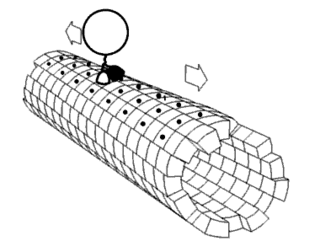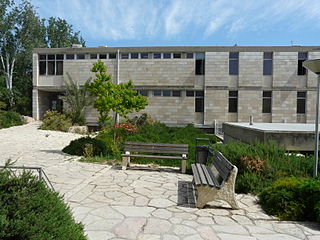Chemistry is the scientific study of the properties and behavior of matter. It is a physical science within the natural sciences that studies the chemical elements that make up matter and compounds made of atoms, molecules and ions: their composition, structure, properties, behavior and the changes they undergo during reactions with other substances. Chemistry also addresses the nature of chemical bonds in chemical compounds.

Computational chemistry is a branch of chemistry that uses computer simulations to assist in solving chemical problems. It uses methods of theoretical chemistry incorporated into computer programs to calculate the structures and properties of molecules, groups of molecules, and solids. The importance of this subject stems from the fact that, with the exception of some relatively recent findings related to the hydrogen molecular ion, achieving an accurate quantum mechanical depiction of chemical systems analytically, or in a closed form, is not feasible. The complexity inherent in the many-body problem exacerbates the challenge of providing detailed descriptions of quantum mechanical systems. While computational results normally complement information obtained by chemical experiments, it can occasionally predict unobserved chemical phenomena.
Physical science is a branch of natural science that studies non-living systems, in contrast to life science. It in turn has many branches, each referred to as a "physical science", together is called the "physical sciences".
The following outline is provided as an overview of and topical guide to physics:
Quantum chemistry, also called molecular quantum mechanics, is a branch of physical chemistry focused on the application of quantum mechanics to chemical systems, particularly towards the quantum-mechanical calculation of electronic contributions to physical and chemical properties of molecules, materials, and solutions at the atomic level. These calculations include systematically applied approximations intended to make calculations computationally feasible while still capturing as much information about important contributions to the computed wave functions as well as to observable properties such as structures, spectra, and thermodynamic properties. Quantum chemistry is also concerned with the computation of quantum effects on molecular dynamics and chemical kinetics.

Theoretical chemistry is the branch of chemistry which develops theoretical generalizations that are part of the theoretical arsenal of modern chemistry: for example, the concepts of chemical bonding, chemical reaction, valence, the surface of potential energy, molecular orbitals, orbital interactions, and molecule activation.

Biophysics is an interdisciplinary science that applies approaches and methods traditionally used in physics to study biological phenomena. Biophysics covers all scales of biological organization, from molecular to organismic and populations. Biophysical research shares significant overlap with biochemistry, molecular biology, physical chemistry, physiology, nanotechnology, bioengineering, computational biology, biomechanics, developmental biology and systems biology.

Computational physics is the study and implementation of numerical analysis to solve problems in physics. Historically, computational physics was the first application of modern computers in science, and is now a subset of computational science. It is sometimes regarded as a subdiscipline of theoretical physics, but others consider it an intermediate branch between theoretical and experimental physics — an area of study which supplements both theory and experiment.

The Technical University of Munich is a public research university in Munich, Germany. It specializes in engineering, technology, medicine, and applied and natural sciences.

The Gottfried Wilhelm Leibniz Prize, or Leibniz Prize, is awarded by the German Research Foundation to "exceptional scientists and academics for their outstanding achievements in the field of research". Since 1986, up to ten prizes have been awarded annually to individuals or research groups working at a research institution in Germany or at a German research institution abroad. It is considered the most important research award in Germany.
Kizhakeyil Lukose Sebastian is a professor of chemistry at the department of Inorganic and Physical Chemistry of Indian Institute of Technology, Palakkad, India. Prior to becoming a professor at IIT Palakkad, he was a professor of chemistry at the department of Inorganic and Physical Chemistry at Indian Institute of Science, Bangalore, for about 20 years.

Karl James Jalkanen, FRSC,, is a research scientist in molecular biophysics. He is currently a research scientist at the Gilead Sciences new La Verne, California manufacturing facility in the Department of Technical Services.
Frank Neese is a German theoretical chemist at the Max Planck Institute for Coal Research. He is the author of more than 440 scientific articles in journals of Chemistry, Biochemistry and Physics. His work focuses on the theory of magnetic spectroscopies and their experimental and theoretical application, local pair natural orbital correlation theories, spectroscopy oriented configuration interaction, electronic and geometric structure and reactivity of transition metal complexes and metalloenzymes. He is lead author of the ORCA quantum chemistry computer program. His methods have been applied to a range of problems in coordination chemistry, homogeneous catalysis, and bioinorganic chemistry.

The Racah Institute of Physics is an institute at the Hebrew University of Jerusalem, part of the faculty of Mathematics and Natural Sciences on the Edmund J. Safra Campus in the Givat Ram neighborhood of Jerusalem.

Bidyendu Mohan Deb is an Indian theoretical chemist, chemical physicist and a professor at the Indian Institute of Science Education and Research, Kolkata (IISER). he is known for his studies in theoretical chemistry and chemical physics. He is an elected fellow of the International Union of Pure and Applied Chemistry, The World Academy of Sciences, Indian National Science Academy and the Indian Academy of Sciences. The Council of Scientific and Industrial Research, the apex agency of the Government of India for scientific research, awarded him the Shanti Swarup Bhatnagar Prize for Science and Technology, one of the highest Indian science awards, in 1981, for his contributions to chemical sciences.

The TUM School of Engineering and Design is a school of the Technical University of Munich, established in 2021 by the merger of four departments. As of 2022, it is structured into the Department of Aerospace & Geodesy, the Department of Architecture, the Department of Civil & Environmental Engineering, the Department of Energy & Process Engineering, the Department of Engineering Physics & Computation, the Department of Materials Engineering, the Department of Mechanical Engineering, and the Department of Mobility Systems Engineering.

The TUM School of Life Sciences is a school of the Technical University of Munich, located at its Weihenstephan campus in Freising. It encompasses the life sciences, in particular biology, agricultural science, food technology, landscape architecture, biotechnology, and nutrition.

The Campus Garching is a campus of the Technical University of Munich and a number of other research institutes, located around 10 km north of Munich in Garching. At the same time, it constitutes a district of the city. With more than 7,500 employees and around 17,000 students, it is one of the largest centers for science, research and teaching in Germany.

The TUM School of Computation, Information and Technology (CIT) is a school of the Technical University of Munich, established in 2022 by the merger of three former departments. As of 2022, it is structured into the Department of Mathematics, the Department of Computer Engineering, the Department of Computer Science, and the Department of Electrical Engineering.














